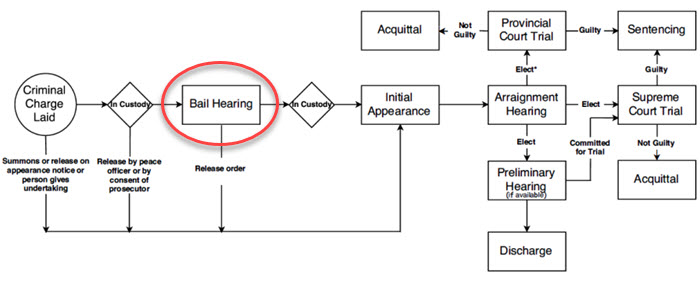Justice Centre
A person arrested and detained by police during the night or on a weekend may be released on bail by a judicial justice at the provincial Justice Centre after a hearing conducted by telephone or video conferencing. If they are not released they will be ‘remanded in custody’ to appear before a Provincial Court judge.
Bail hearing
If someone has been arrested and kept in custody by a police officer or judicial justice, they will appear before a judge in Provincial Court as soon as possible for a bail hearing (also called a “show cause” or “judicial interim release” hearing). They may have their own lawyer or a Legal Aid Duty Counsel to speak for them at a bail hearing that day, or they may agree to put off their bail hearing and remain in jail in order to get their own lawyer privately or through Legal Aid.

At a bail hearing, the prosecutor (“Crown Counsel”) will tell the judge the allegations against the arrested person and any criminal record they may have. The defence lawyer will tell the judge the person’s background, roots in the community (home, family, work or school, etc.), and anything else that might help the judge decide.
If someone is released, their matter will be adjourned to an “Initial Appearance” on a later date. If they aren’t released, they’ll be held in jail (“remanded in custody”) until their next court date. The Court tries to provide as early trial dates as possible for people held in custody.
The law
At a bail hearing a judicial justice or judge must decide whether it is necessary to keep an arrested person in jail (“detain them in custody”), or whether they can be released with or without rules for their conduct (“conditions”).
The judge or justice must follow the law set out in section 515 of the Criminal Code. In most cases*, people charged with criminal offences have the right to be released unless the prosecutor establishes that they should be kept in jail until their trial to make sure they attend court or to protect the public. The Criminal Code states that primary consideration is to be given to the release of the accused at the earliest reasonable opportunity and on the least onerous conditions appropriate.
If the prosecutor does not establish this, an accused person must be released on a bail order called a “release order”. Conditions (rules) may only be added to the order if the prosecutor shows they are justified and why any less onerous form of release would be inadequate. A bail order might require:
• someone to deposit money with the court (“post bail”);
• someone to sign as a surety (a person who guarantees the accused person’s good behaviour) and pay the amount set as bail if the accused person fails to attend or disobeys the bail order;
• the accused person to obey rules like a curfew, restriction on areas they can enter, contact with a victim, possessing weapons and firearms, or a requirement to live at a substance abuse treatment centre.
When deciding whether detention or conditions are required, judges and justices must consider three things:
2. whether they are likely to commit crimes if released or are dangerous to the public (“the secondary ground”)
3. in some cases, whether release on bail would cause people to lose faith in the administration of justice (“the tertiary ground”)
The Criminal Code states that a judge or justice must also give particular attention to the circumstances of Aboriginal accused and accused who belong to a vulnerable population that is overrepresented in the criminal justice system and that is disadvantaged in obtaining release.
Learn more about bail hearings.
* Exception: When people are charged with certain offences (“reverse onus offences”), including some drug trafficking offences, firearms offences and offences involving violence against an intimate partner (when the accused person has a previous conviction involving violence against an intimate partner), section 515(6) of the Criminal Code requires that they be kept in jail unless they establish that their detention is not justified.
This website provides general information only and should not be used as a substitute for legal advice.
Updated February 2020

